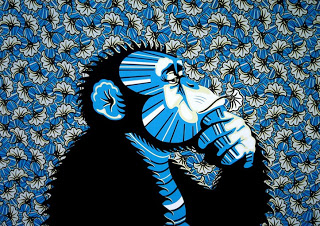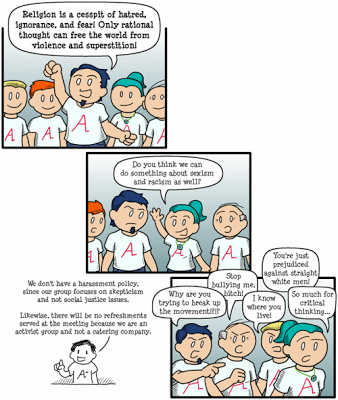As readers may be aware, I take issue with the abolitionist position on atheism and feminism. I won’t rehash those points here, but given those developments, myself and a few other activists thought it prudent to branch off and begin a new project in 2011-12, one that specifically valued rationality. As a scientist and an atheist, this position seemed well-suited to my worldview. I began to advocate for a rational, evidence-based approach to Nonhuman Animal liberation. Instead of drawing on personal beliefs, religion, experience, etc., I have argued that we need to hold our tactics and theory up to scrutiny. Does it work? And does it work for the right reasons? If not, we’re not making any headway. Now is the time to abandon personal allegiances, idol-worship, and comfortable (but ineffective) approaches.
And so I became an ardent supporter of VeganUK, a small internet community that favors a rational approach and offers a safe space for atheists to connect and collaborate. I started publishing papers and blogging about our new approach. I became an administrator for the VeganUK Facebook group. I became an editor for their magazine, The Abolitionist (now defunct). I spent hours and hours at this non-paid position because my heart was in it, because I really believed in the project.
At this time, I was also studying feminist theory heavily. Teaching gender at the university level, I became immersed in the research on gender inequality, rape culture, and patriarchy. It was starting to inform my activist work.
It was then that I began to notice that other feminists who also valued a rational approach to Nonhuman Animal advocacy were routinely being shouted out and then banned from VeganUK. The community rules, in so many words, stated that if you don’t hold up to scrutiny, you get the boot. Which is fine if we’re valuing rationality, but it soon became clear that this was a ruse to subdue critical feminist thought. There was intense pressure on female group members to agree with the men and ignore the feminist experience that shows women another side to reality that men are more or less oblivious to.
The utopian dream of rationality is achieving 100% objectivity. But this dream of pure objectivity completely obscures the fact that human beings are themselves tools of measurement. Humans are products of socialization, they are prone to error and bias. The scientific method works to reduce bias, but it cannot account for how one’s identity shapes the very questions we choose to ask. Neither can it assure that how we choose to research the question and how we interpret the results is done with complete objectivity. So long as the human factor is involved, there will always be bias.
Feminists argue that recognizing differential socialization and privilege is a more honest approach to a scientific inquiry into social inequality. Social beings studying the social are never divorced from the social. If you can’t get rid of bias, the next best thing to do is own up to it. If your tool is imperfect, you will have imperfect results. Pretending the imperfection isn’t there is unprofessional, dishonest, and often dangerous.
In advocating this position, a position widely accepted within the scientific community, taught to students of science, and often required in scientific publications, I was ridiculed as “unscientific” by individuals in the group with no formal scientific training themselves.
Men who identify as atheists and skeptics with a few Richard Dawkins books on their shelf are encouraged to think themselves arbiters of what is deemed legitimate science. I suspect, however, that their claim to expertise (with no qualifications to support it) is a prop for patriarchal oppression. These identity markers help already privileged people appear more important, authoritative, and wise. This mechanism protects the white male position and delegitimizes marginalized voices.
I will not rehash the illogical and often hateful “rationalist” arguments some vegan men use to adulterate feminist theory, as I don’t think they warrant any further platform. The atheist movement itself, where much of this anti-feminist rhetoric originates, is rife with sexist claimsmaking and abusive treatment of women.
A few years ago, feminists in the atheist (rational/skeptic/humanist/free-thinker) community began to speak out against the harassment they’d been enduring online and at conventions. Prominent male leaders such as Dawkins either ignored or mocked their complaints. In response, many women and their allies created “Atheism+”, a social change space where intersectionality is encouraged and social inequalities are explored through a rationalist lens.
Atheist+ proponents argue that it is not enough to dissect the role of institutionalized religion in oppressing humans as a general matter. When we operate according to generics (i.e. “humans,” “humanity,” or “mankind”), we more often than not default to the experience of privileged, white, heterosexual men. We need a more nuanced approach that recognizes how the white male experience is not the universal experience.
Importantly, Atheism+ explicitly acknowledges that the unique circumstances of marginalized experiences are largely ignored in atheist activism. As the popularity of Atheism+ increased, atheism was no longer seen as a space for men to reassert their white male superiority and mock religious people (who, by the way, are often from vulnerable non-white, non-male demographics). Atheism was now about inclusivity and compassion for at-risk populations.
Unfortunately, the Atheist+ movement met with considerable hostility for their efforts, and the rift in the atheist community remains. Female free-thinkers have launched new web spaces and an annual women’s conference, but many men in the movement continue to belittle feminists and harass them. At the 2013 Women in Secularism conference, the Center for Inquiry’s CEO Ron Lindsay opened the event with a speech bemoaning how feminist critique was nothing more than a means to silence men. The realities of patriarchy can be completely lost on even those men supposedly in support of the feminist approach to free-thought.
The generic rational approach, more often than not, hides behind masculine ideology and the rhetoric of rationality to bully, intimidate, and ultimately silence women, people of color, and other vulnerable persons. As often as rationality is used to liberate, it is used to oppress and maintain inequality. Rather than prioritizing criticism and discourse, it becomes a legitimized means of stifling marginalized voices to the benefit of privileged white males.
When I originally wrote this essay in 2013, one the leaders of VeganUK was stalking my every move online. He watched everything I posted on my blog, on my public Facebook page, Twitter, etc. He was also screencapping any of this feminist behavior he found objectionable, emailing me with these images as “evidence.” He filled up my inbox with threats to sue me for voicing free speech over public content that I find problematic and sexist.
For any woman who has been a victim of violence at the hands of men who have stalked them (and there are many), it should be clear how behavior of this kind is both inappropriate and violent. And it is gendered. It is a classic technique wielded to threaten, frighten, and control women. Apparently, free speech, rational thought, and criticism are appropriate only when they do not target privileged white men. I say this because feminist rationalists are abused in similar ways as a matter of course. The rationality movement is systematically seeking to erase women’s skepticism.
Until it went defunct sometime in 2015, The Abolitionist was also hosting my work without my permission. I contacted four VeganUK administrators explicitly requesting that my work be removed, as I had no desire to be associated in any way with a group that promotes anti-feminist sentiment. All refused my request; insisting that my work was not mine to control. Although I had signed no copyright, they took my volunteered efforts to be the sole property of VeganUK.
For a group that claims to promote science, rationality, and integrity, I was quite shocked that academic dishonesty and blatant theft were actually being defended. I was informed, more than once, that it was up to them to decide what to do with my work. But, then, science has a long history of appropriating the ideas and discoveries of women for patriarchal legacies. This would become an important life lesson for me as a female scientist and academic.
When men can’t shut women up with language of authority, power, and knowledge (more “sophisticated” and legitimated means of controlling women), they simply revert to the tried and true method of harassing and threatening them. When that doesn’t work, they can rip the carpet out from under marginalized folks by stealing their contributions and rendering them invisible. Sadly, it works. Science has been effectively doing so for over 200 years.
Privilege will always try to silence others to protect itself. But, as always, onwards and upwards. I’m still a scientist, I’m still an atheist, I still value rationality . . . I just keep a skeptical woman’s eye on it all from a safe distance. The vegan rationality community is a dangerous space for many critical thinking women, and it’s nothing I want to be a part of. My efforts here are shared in hopes of reaching readers who value social justice and critical thinking, and those women who might be comforted in knowing they are not alone in their experiences.
A version of this essay was originally published on July 16, 2013 on The Academic Activist Vegan.

Readers can learn more about vegan atheism in my 2016 publication, A Rational Approach to Animal Rights. Receive research updates straight to your inbox by subscribing to my newsletter.


